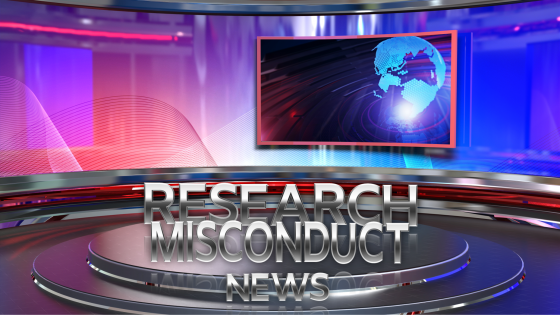Note: Due to the nature of web page evolution, some historic links may be broken.
| To jump to a month, click on your choice below: | |||||
|---|---|---|---|---|---|
| January | February | March | April | May | June |
| July | August | September | October | November | December |

Nature
Mohana Basu
China’s science ministry will crack down on universities that fail to investigate or sanction researchers who are involved in serious research misconduct. The move is part of a renewed push to get academics and their institutions to take scientific integrity more seriously.
The nation’s Ministry of Science and Technology (MOST) said in a notification on its website that institutions should focus on investigating papers that are retracted in international science journals as a result of misconduct.
The results of those investigations will be publicized to enhance deterrence. Institutions will face serious penalties if they conceal or tolerate wrongdoing by their researchers, the note states, although it does not reveal what those penalties might be.
Holding institutions accountable can be an effective way to curb academic misconduct, says Li Tang, a science- and innovation-policy researcher at Fudan University in Shanghai, China. Research integrity is often managed most effectively when done at the institutional level, she adds.
Continue reading "China to punish universities that fail to sanction research misconduct"
Nature
Amanda Heidt
As a neuroscience postdoc at the MRC Laboratory of Molecular Biology in Cambridge, UK, Letizia Mariotti was part of a core group of friends navigating the early steps of their careers. Even after the four friends scattered to academic posts across Europe they continued to meet virtually to talk through the challenges of launching a laboratory.
It quickly became apparent that their duties as principal investigators far exceeded the bench skills that they’d learnt as postdocs. Mariotti, for example, struggled with the paperwork needed to hire her first international postdoc at the Institute of Neuroscience of the National Research Council in Padova, Italy. And one of her friends discovered that researchers in France embrace formal academic titles in ways that they hadn’t experienced in the United Kingdom. “You could never predict when something would happen that you’d never had to think about before,” Mariotti says.
The group collectively recognized that labs need a document that, rather than simply laying out methods and bench protocols, focused on culture and ethos: everything from where to access on-campus resources to intangibles such as a group’s shared mission and codes of conduct.
BMJ Group
Baptiste Scancar, Jennifer A. Byrne, David Causeur, Adrian G Barnett
Research paper mills are “contract-cheating organisations which provide undeclared services to support research manuscripts and publications.” Research paper mills fabricate and submit manuscripts for their customers. The first research paper mill activity was reported in the 2010s, and has since increased in volume and sophistication. More than 400 000 papers suspected to have originated from paper mills have been published in the past 20 years, with the paper mills earning tens of millions of dollars annually. This issue gained visibility when Wiley—after acquiring Hindawi—retracted nearly 11 000 suspected paper mill papers and shut down 19 journals over two years.
Research paper mills maximise their earnings by quickly producing industrial quantities of low quality research papers. To produce manuscripts at scale, fabrication has likely relied on templates with premade sentences where domain specific terms vary. Suspect papers can include incorrect reagents, fabricated data and experiments, and photoshopped or reused figures. Paper mill papers are often generic, poorly written, lack coherence between sections, and may offer superficial research justifications.
Science
Zvonimir Marelja
When a paper I had spent years working on tirelessly was published in Science, others expected me to be happy. One senior scientist immediately urged me to work on securing my own funding for a follow-up project and added, “If you want to become a PI [principal investigator], you now have to give 150%.” The advice was well-meaning; in his view, the Science publication was a step toward a job leading a lab. But it wasn’t clear how I would find the energy to keep going. After 8 years pouring myself into one postdoc project and submitting to Nature and Science, I barely had 50% left.
Years earlier, when I moved to France to start the project, I was full of enthusiasm and happy to work long hours. But as time went on and I struggled to get my project off the ground, pressure and insecurity became my main motivators. If I failed, I feared I would never get a job in academia.
Haunted by low self-esteem, I put pressure on myself to work harder and felt guilty whenever I took a break. Weekends disappeared into experiments, vacations shrank to a few days, and my mind no longer knew how to rest.
Continue reading "How chasing a high-impact publication nearly broke me"